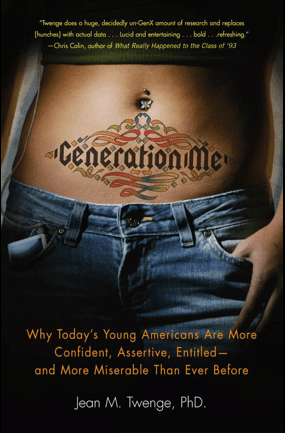1991, carpooling 2 bunheads to after school ballet class:
“Hey Jessica, did the self-esteem guy come to your class today?”
“Yeah, Vanessa, it was SO funny! The guy picked Kelly to sit on a chair and told her to sit or stand depending on how she felt, then he said you come to school and find out that there’s a spelling test and you forgot to study – Kelly slumped in the chair – then you get in trouble with the teacher and get sent to the principal’s office – Kelly groveled on the floor – then the principal gives you peppermint candy – Kelly sat back up on the chair – and then this really hot boy comes along and says I think you’re really hot I want to go out with you – Kelly stood on her tiptoes on the chair, it was SO funny!”
“Yeah, yeah, it was SO funny!”
“Wait a minute, Jessica, Vanessa, that’s not how you get self-esteem. You study for that spelling test and try your best to do well and stay out of trouble. Why would anyone give you candy for misbehaving, and what’s this about boys telling girls that you’re hot in 4th and 5th grade? Who gave this workshop anyway?”
The next day, I wrote a letter to my daughter’s principal to verify the story and express my concern – I think I used the words ‘offended as a person, mother, teacher and woman.’ Who gave the workshop? A young man, a self-esteem expert working for a reputable social service organization and hired by the school to teach that curriculum. The principal passed my message along to the young man who related back that he was very upset by my letter. Now I know why. The self-esteem expert was a member of Generation Me.
 According to Jean M. Twenge, Ph.D. author of Generation Me, children who grew up in the 70’s, 80’s and 90’s, are independent, confident, tolerant, assertive, special, entitled – and miserable. By the 70’s, perhaps due to societal shifts such as divorce, that misery exhibited itself in measurable declines in children’s self-esteem. And thus the call went out for all schools to teach self-esteem, that is, self-esteem for self-esteem’s sake.
According to Jean M. Twenge, Ph.D. author of Generation Me, children who grew up in the 70’s, 80’s and 90’s, are independent, confident, tolerant, assertive, special, entitled – and miserable. By the 70’s, perhaps due to societal shifts such as divorce, that misery exhibited itself in measurable declines in children’s self-esteem. And thus the call went out for all schools to teach self-esteem, that is, self-esteem for self-esteem’s sake.
Twenge did not discuss the curriculum specifically, but if my daughter Jessica’s experience was representative, it’s no wonder the personal responsibility message got flipped. To Me’s, self-esteem is who you are innately, not what you do – and it’s not your fault when things don’t work out. Unsurprisingly, things didn’t work out. The results of all these self-esteem programs according to Twenge, was zero, no impact, nothing – except Me’s have a harder time with criticism like mine. And as young adults, they suffer higher rates of anxiety, loneliness and depression.
Experts now recommend replacing self-esteem curriculum with practices that focus on self-control and self-discipline. “True self-confidence comes from honoring your talents and learning things, not from being told you’re great just because you exist,” Twenge wrote. “There is nothing wrong with being good at some things and not others – that’s life.”
I would add: work hard to develop and use talents, abilities and skills; act responsibly, justly and humbly; care for others lovingly – that’s life.



Self compassion is a healing antidote to the limitations of empty self esteem. In our endeavors, we will invariably sometimes fail. Self compassion provides a way to try, to succeed and to occasionally miss the mark without undue suffering.
http://self-compassion.org/video-clips/self-compassion-vs-self-esteem.html
I read your comment and viewed the video clip on your site – thank you!
I’m puzzling. Self-compassion seems to connote liking, taking care of and forgiving oneself. But I think self-compassion as self-pity is a real danger. Also, sometimes when we fail, we must suffer well in order to make changes for the better.
In my experience, focusing not on myself but on what God expects of me (my mission and service to others) has been the key to self-esteem.
Would love to read you write on suffering well.
Thank you so much for your request, which I will honor in next Monday’s post.
It would be depressing if all one’s self-esteem were based on outside approval … as opposed to virtuous acts … rugged self-effacing individuals would have a hard time fitting in. I think ‘Me’s’ might include a lot of ‘herd followers’ trying desperately to stay in fashion: clothes, music, politics, etc. Among the tolerant ‘Me’s’ I suspect not much tolerance for criticism of any kind. Self criticism is unlikely to catch on. So much for my long talks with my mirror … I guess it would be better if I just primp!!
A friend recently told me that her adolescent/young adult children have a hard time fitting in because they don’t follow popular culture. They have better things to do, and thus I suspect that having “a hard time fitting in” is a blessing. For those of us older folks, longs talks with ourselves in the mirror are another kind of a blessing that I would wish for everyone. Not looking at oneself with self-loathing but with honest assessment and accountability.
Thank you for your comment!